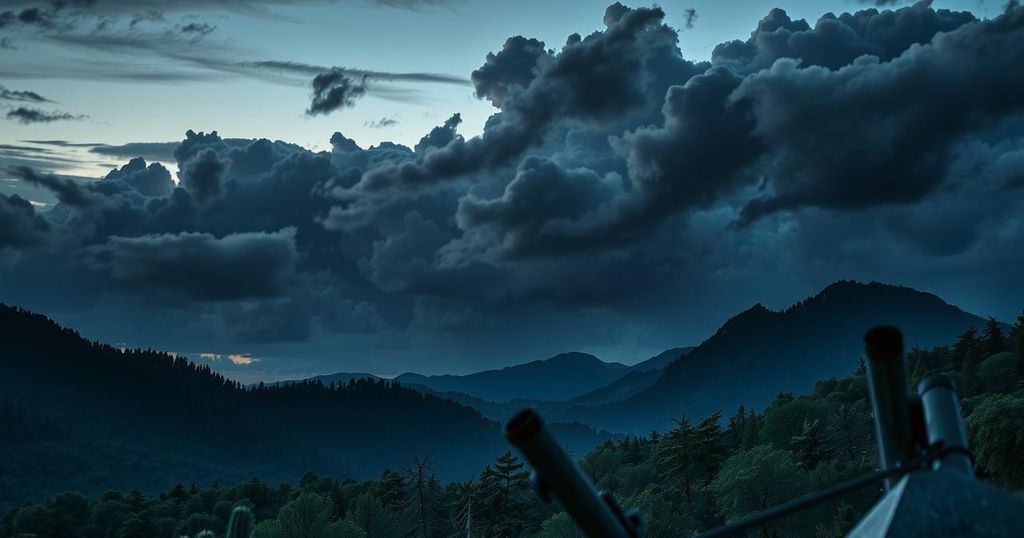World news
” TESONGO, AFRICA, ANGOLA, BORDER SECURITY, CIVIL WAR, CONGO, CONGO (KINSHASA), CORRUPTION, DEMOCRATIC FORCES FOR THE LIBERATION OF RWANDA, DEMOCRATIC REPUBLIC OF CONGO, DRC, FDLR, GOMA, HUMANITARIAN, JOÃO LOURENÇO, JOAO LOURENCO, KAGAME, NORTH AMERICA, PATRICK MUYAYA, PAUL KAGAME, RWANDA, RWANDAN DEFENCE FORCE, SOUTHERN AFRICAN DEVELOPMENT COMMUNITY, TESONGO, UN SECURITY COUNCIL, UNITED STATES, VICTOR TESONGO, WAR
Fatima Alavi
0 Comments
Kagame’s Uncertainty on Troop Presence in DRC Amidst Escalating Violence
Rwandan President Paul Kagame stated he does not know if Rwandan troops are in the DRC amid escalating conflict in the region involving M23 rebels. Over 900 deaths have been reported in Goma due to violence. Despite Kagame’s claims of uncertainty, various international figures affirm Rwanda’s military presence in the DRC, complicating diplomatic relations.
Rwandan President Paul Kagame expressed uncertainty regarding the presence of Rwandan troops in the Democratic Republic of Congo (DRC) during an exclusive CNN interview. This statement comes amid escalating violence in the east of the DRC, primarily involving the M23 rebel group, which has reportedly led to over 900 deaths and thousands of injuries in recent days. Observers maintain that Rwanda is supporting M23 rebels, who claimed to take control of Goma last week, a situation that raises serious international concerns about the conflict.
Kagame’s remarks are striking, considering he is the commander-in-chief of the Rwandan Defence Force. “I don’t know,” he said when questioned about troop deployment in the DRC. In what seemed an evasive approach, Kagame acknowledged, “There are many things I don’t know.” Nonetheless, he affirmed Rwanda’s right to act in self-defense regarding regional stability. “If you want to ask me, is there a problem in Congo that concerns Rwanda? And that Rwanda would do anything to protect itself? I’d say 100%,” he asserted.
According to reports from the United Nations, at least 900 bodies have been retrieved from the streets of Goma following a surge of violence. The UN Office for the Coordination of Humanitarian Affairs noted, as of January 31, that the figure reflects an urgent humanitarian crisis. In response, M23 spokesperson Victor Tesongo denied any support from Rwanda, referring to allegations as a misinterpretation aimed at undermining their credibility.
It seems that Rwanda’s perceived involvement in the conflict has spurred a robust denouncement from DRC officials. Patrick Muyaya, the DRC communications minister, told CNN that Kagame’s denial of military involvement is isolated from a broader consensus on the issue. “Kagame is the only voice denying this,” he stated, highlighting confirmations from various international figures and organizations that figure Rwanda’s military presence within eastern DRC firmly on record.
In a pointed question regarding comparisons to Russian President Vladimir Putin, known for backing separatists in Ukraine, Kagame responded with resigned acceptance of public perception. “There will be so many stories,” he remarked, adding, “what can I do about it?” He emphasized that Rwanda must prioritize its own survival despite external narratives.
Kagame also described the Democratic Forces for the Liberation of Rwanda (FDLR)—another significant armed group in the DRC—as an “existential threat” to his country, alleging their integration into the Congolese military. “Nobody, including the United Nations or the international community, is going to do it for us,” he declared, underlining the fight for national security.
As Rwanda grapples with a resurgence of conflicts, spokesperson Yolande Makolo revealed that shelling in Goma has already claimed 16 lives in Rwanda. Meanwhile, DRC’s President Felix Tshisekedi has committed to a “vigorous and coordinated response” to the M23, asserting accusations of them being merely a “puppet” of Rwanda. M23 remains unyielding in its objectives, asserting plans to expand territorial control beyond Goma to the DRC’s capital, Kinshasa, claiming a need for leadership change in the region.
The complex situation in eastern DRC continues to unfold as Rwandan President Paul Kagame publicly distances himself from claims regarding troop deployment in the conflict. With the M23 rebel group capitalizing on instability, and incidents of violence escalating, regional and international diplomatic responses are closely scrutinized. There appears to be a mounting consensus regarding Rwanda’s involvement, while Kagame insists on the necessity of national defense. As tensions simmer, the prospects for peace remain uncertain, with dire implications for both nations and the broader region.
Original Source: www.cnn.com




Post Comment